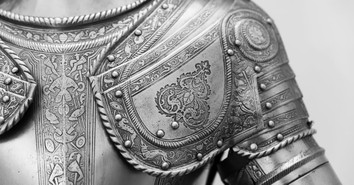Can You Really Love Your Neighbor if You Don't Love Yourself?

Editor's Note: Pastor Roger Barrier's "Ask Roger" column regularly appears at Preach It, Teach It. Every week at Crosswalk, Dr. Barrier puts nearly 40 years of experience in the pastorate to work answering questions of doctrine or practice for laypeople, or giving advice on church leadership issues. Email him your questions at roger@preachitteachit.org.
Dear Roger,
I was reading about the Great Commandment in Matthew 22. Jesus said that we are to love God with all our heart, soul, and mind. Jesus said that we are to love our neighbors as ourselves. I got to thinking, “This must be very difficult for some.” I’ve discovered that a lot of people don’t love themselves well. It must be hard to love your neighbor as yourself when you don’t love yourself very well. What do you think about that?
Sincerely,
Sarah
Dear Sarah,
Maybe Jesus should have said, “Love your neighbor better than you love yourself.”
I came across a study by the American Health Organization which commissioned a Gallup survey about self image: “If you could change anything about yourself, what would it be?”
They discovered that women would like a dress size two to four times smaller. They would like to be one inch taller, weigh 11 pounds less, have good muscle tone, curly brown hair, and a bronzed suntanned look.
Forty-eight percent would cover aging symptoms, 37 percent would fix their teeth, 34 percent desire better legs, 18 percent desire smaller feet.
What would men change? The average man would like to be one inch taller, weigh several pounds lighter, and be more muscular.
Men want hairy chests because they think that women like men with hairy chests—and men are right! Twenty-eight percent would ask for less aging signs. Nineteen percent desire a smaller nose.
The Greatest Commandment
Matthew 22:34-39: “‘Teacher, which is the greatest commandment in the Law?’ Jesus replied: ‘Love the Lord your God with all your heart and with all your soul and with all your mind. This is the first and greatest commandment. And the second is like it: Love your neighbor as yourself.’”
Unfortunately, many of us have a problem. We have trouble even liking ourselves. If we don’t like ourselves, then it is rather difficult to love our neighbor as we love ourselves.
Loving ourselves better means improving our self-image in a way that increases self-esteem.
We know better than to attack our neighbors with words like: "You are not pretty... You are fat... stupid... no good... defective... I have my mother's thighs!"
Why would we treat ourselves like this? It depends on whether we have a good self image or a poor one.
What is a Self-Image?
Our self-image is the picture we have in our minds of ourselves.
Our idealized-self is what we think we ought to be.
Our self-esteem is how we feel about ourselves, good or bad.
In 1 Corinthians 15:10, Paul had all three concepts in mind when he wrote: “By the grace of God I am what I am.”
Where Does Our Self-Image Come From?
Our self-image is developed mainly from the images of ourselves which are reflected back to us by other people, our culture, and our God!
1 Corinthians 13:12: “Now we see but a poor reflection as in a mirror; then we shall see face to face. Now I know in part; then I shall know fully, even as I am fully known.”
My father mirrored back to me a great sense of worth: “Roger, you can succeed at anything you try. I see you loving people, building relationships and working hard. I am so proud of you.”
On the other hand, too often mirrors reflect to us poor images of ourselves: “You are always in the way. You will never amount to anything. You’re not worth my time. You’re lazy. I don't know what I am going to do with you. You’re the devil’s child.”
Culture and society say that if we have beauty, we are a step up on others. If we’re not pretty or handsome, we can be brushed aside. Many feel forced to nip and tuck in an attempt to raise self-image.
Marvelous reflections come from the God who created us (Psalm 139:13-16). If we are to become the people that God wants us to be, we must paint in our minds the image that God has in mind when He thinks of us as his finished work.
What Does a Poor Self-Image Look Like?
People with Poor Self-Images:
- Don’t trust themselves to make the right decisions
- Question their abilities
- Worry about what people think of them
- Think that if people see them as they really are, they’ll be rejected
- Often wear masks in order to hide from self, others, and God
- Work hard at proving their worth
- Have difficulty accepting compliments and criticism
- Have trouble separating “no” from rejection
- Struggle to let go of a negative past
What Does a Good Self-Image Look Like?
People with a Good Self-Image:
- Accept themselves for who they are
- Are willing to open themselves and share without fear of criticism or rejection
- Believe in their personal abilities to make good decisions
- Relate well to people and share other’s burdens while listening to their problems
- Have a sense of belonging to others, to a group, or to society
- Listen to complaints without going on the defensive
- Feel no need to super achieve in order to prove anything to anybody
How May We Develop a Good, Healthy Self-Image?
1. Develop an accurate baseline.
Analyze where you are in terms of your idealized self and your current self-image to get a sense of your self-esteem. Remember, the smaller the gap between self-image and idealized self, the higher your self-esteem will be.
When analyzing your base-line image, be careful about two things:
First, be careful that your idealized self is within the bounds of reality.
When I began pastoring my first full-time church, I wanted to be the best pastor God ever had. Sometimes, I imagined God saying, “I’m so glad you’re finally here in heaven. We’ve been waiting for you. You’re the best pastor that I ever had.” My goal was to reach the entire city of Tucson for the Lord Jesus Christ. Rather soon, I realize that I couldn’t even reach all the people on my street for Jesus.
Second, don’t sell yourself short.
If the people around you often criticize you and tell you what a bad person you are, you may discover that it’s hard to imagine a healthy idealized self. Imagine it anyway! It’s one thing to aim too high. It’s a shame to shoot too low.
2. Distinguish between what’s true and what’s not. What’s helpful and what’s not.
Look for the truth. If we receive messages like, “You’re too fat, you’re stupid, you’ll never amount to much,” don’t incorporate those ideas without questioning them.
To develop a positive self image, you must start questioning those ideas. If they’re not true, reject them. If they are true, work to better those areas.
3. Water the flowers, not the weeds, in your garden.
I’m tired of telling myself that I’m too fat. I’m tired of thinking that Jesus is disappointed with me because I was not good enough as a pastor. I’m tired of telling myself things like, “I’m so selfish” or, “Many people at church don’t like me.”
What do you like most about yourself? What results/achievements are you most proud of? What do you do well? Think about those things.
4. Be nice to yourself.
I look in the mirror every morning and say: “Roger, you are the handsomest man I’ve ever seen.” It is not true, but it feels good.
5. Invest time with people who build you up and appreciate you for who you are.
Limit your time with those who put you down and constantly criticize you.
6. Enjoy the person of value that the Lord Jesus has made you to be.
God is the correct mirror to reflect to us a proper image and self-concept.
If we can buy into the next several verses, our self-image and self-esteem will soar.
- God created us just below the angels (Psalm 8:1-5). He created us not just a little higher than the animals. He made man just a little lower than the angels.
- God prescribed us in detail before our birth (Psalm 139:14-16).
- God's universal ideal is to develop our internal character to look like Jesus Christ (1 Samuel 16:70, Matthew 5:3-12, and Romans 8:28-29).
- "Man looks on the outward appearance, God looks on the heart" (1 Samuel 16:70).
- Romans 8:28-29: He has predestined us to be conformed to the likeness of His Son--emotionally, mentally, and spiritually.
7. Thank God that He isn't finished with us.
Like potter and his wheel, only He knows how He wants to mold the product (Isaiah 45:9-10).
Philippians 1:6: "Being confident, He who began a good work will bring it to completion..."
Ephesians 2:10: “For we are God’s handiwork, created in Christ Jesus to do good works, which God prepared in advance for us to do.”
Love, Roger

Photo courtesy: ©Thinkstock/razyph
Originally published January 24, 2019.





